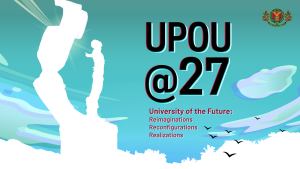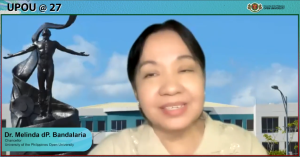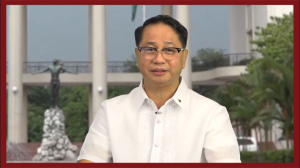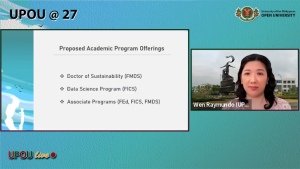
To commemorate the 27th founding anniversary of the UP Open University (UPOU), a virtual event was held on 23 February 2022. The theme for the event was, “University of the Future: Reimaginations, Reconfigurations, and Realizations.” Since its establishment, UPOU has sustained its commitment to its vision of continuously coming up with ways to deliver quality online distance learning education and actively take part in the fast-changing world.

In her opening remarks, UPOU Chancellor Melinda dela Peña Bandalaria shared that 27 years ago, UPOU was established as one of the constituent universities of the University of the Philippines (UP) to focus on distance education. “Being unconventional and catering to the learning needs of non-traditional learners, the implementation of [UPOU’s] distance education programs from the first generation until its current configuration, can be described as full of imaginations and re-imaginations in the search of what works best.” Dr. Bandalaria highlighted the almost three-decade milestone of the online distance learning mode of education of UPOU and how it was motivated by pedagogically grounded and scientifically-based strategies and approaches.

Mr. Danilo Concepcion, UP President, greeted UPOU with utmost regards and congratulated the University for its venture into distance education in 1995. “We live in a period of significant transition and upheaval, with massive shifts occurring in all aspects of our lives,” shared President Concepcion referring to the pandemic adding other layers of complexities. He also highlighted that technology has transformed the ways how people communicate, work, and learn. “UPOU has always been ahead of its time.” He also mentioned that for the past 27 years, especially in the last two years, UPOU has always willingly shared its resources with other institutions.

Part of the program was the launching of activities for the year. Dr. Maria Rowena D.R. Raymundo, OIC Vice-Chancellor for Academic Affairs, presented the upcoming programs and projects. This includes additional program offerings such as the Doctor of Sustainability, Data Science Program, and various Associate Programs. The UPOU Center on Immersive and Open Pedagogies (CIOP) will also be established. The CIOP is aimed to assist in developing immersive learning models, implement an immersive open pedagogy program, and operate an immersive learning laboratory that will design, develop, and test learning resources, strategies, and models. Moreover, it aims to also assist faculty members in developing immersive learning environments and resources, train staff members and students on immersive learning resources design, development, and utilization; and assist other UP units and HEIs in migrating to immersive learning.
UPOU is also set to develop a web-based Related Learning Experience (RLE) Design as a resource activity material to virtually simulate a 360 view of different clinical set-ups, simulations, and outcomes based on selected case studies. The Faculty of Management and Development Studies (FMDS) on the other hand, will embark on the development of a Filipinized Learning Management System (LMS).
In the hopes of expanding and strengthening its scholarship and financial services, the Office of Student Affairs (OSA) will establish the Reach Everyone and Care to Help Program (R.E.A.C.H.) to focus on a speedy response system to cater to those who are in need.
Dr. Raymundo also presented the various public service initiatives of UPOU for the year. This includes the offering of a MOOC on Multimedia Materials Production by the Multimedia Center, Digital Japanese Communication Series by the Faculty of Information and Communication Studies (FICS), and the offering of a Continuing Education Program (CEP) on Research and Development Management by FMDS in collaboration with Cavite State University. To add, there is also an establishment of a partnership with the Philippine National Police (PNP) for its Open Academy and Online Eco-Training Project for Youth in various communities (Farm, Fishing, Forest, and Urban) spearheaded by the UPOU Office of the Chancellor.
The UPOU Ugnayan ng Pahinungod will also launch a mental health wellness app, a stress reduction technique video series, and an online course on newborn care for mothers. The Faculty of Education (FEd) is also set to conduct an Online Bridge Program for English, Math, and Science courses for Senior High School students. FICS will launch its Infoteach Outreach (Phase 7) in partnership with PLDT, aimed at enabling and upgrading Digital Literacy in various areas nationwide, and Academic Partnership will be forged with the Women Sustainability Forum through the Office of Gender Concerns.
Projects and programs that are aimed to strengthen research and publication include the “Bukas Lab: Kickstarting an Artscience Programme of Radical Research, Creation, Learning, and Innovation through Placemaking, Networking, and Serendipitous Discovery,” and the University of the Philippines Live Open Access Database (UPLOAD), an online archive of scholarship papers, articles, and other publications. To add to this, a Research Conversations Series on Ethics and Publications by the Office of the Vice Chancellor for Academic Affairs, and the Scientific and Educational Cooperation among UPOU and the Aerosol Science Research Center, National Sun Yat-Sen University, Taiwan. The University of the Future (UoF): A Digital Discourse Capture Book is also in the works.
Dr. Jean A. Saludadez, Vice Chancellor for Finance and Administration and the Anniversary Committee chair, concluded the event with UPOU’s achievement in the past 27 years and how it has been astounding despite the pandemic–to have been able to win awards both institutional and individually in the ICDE and from other distance learning institutions globally.
The event was hosted by Ms. Margaret Jarmin-Suarez, University Researcher, Faculty of Information and Communication Studies (FICS) and Program Development Associate for International Linkages. It was held via Zoom and streamed live on UPOU’s Facebook Page. It was attended by UPOU stakeholders–administrators, faculty, students, alumni and partners.
Written by Alessa Shainne Hostalero
Edited by Joane V. Serrano and Anna Cañas-Llamas







